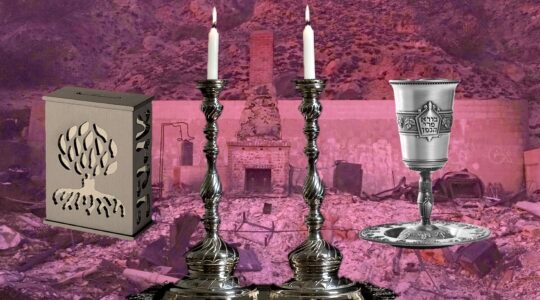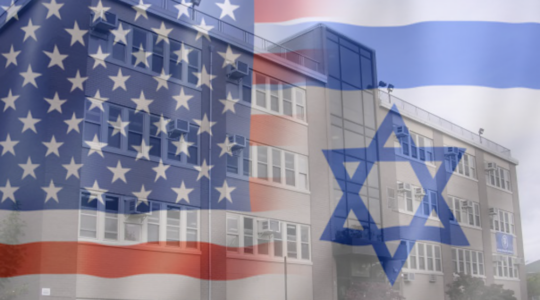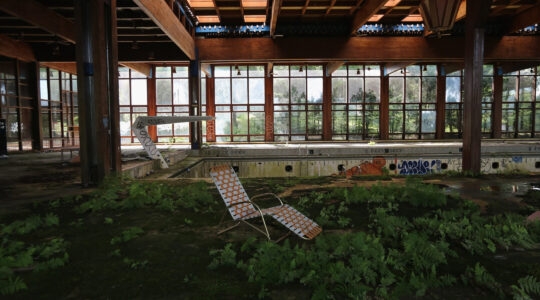In the wake of the recent troubles at the Ethical Culture Fieldston School in Riverdale (“Swastika Incident Reverberating At Fieldston,” Dec. 18), I recently helped facilitate an assembly program for middle school students there. Ninety-year-old Holocaust survivor Hanna Slome spoke, and the students hung onto every word.
When Mrs. Slome finished telling the students about the horrors of the Holocaust and her remarkable journey, Fieldston Middle School Principal Kevin Jacobson opened the floor to a 30-minute question and answer period. We were both pleased and amazed at the students’ enthusiasm and eagerness to learn more from their guest, a witness to the most unimaginable moment of mass inhumanity to man.
We knew we were witnessing something important — not only the reaction of the students but the expressions on the faces of the faculty, the school psychologists and our own docents who had volunteered their time to be present.
I had read the reports detailing the drawing of a swastika and other rumors of incidents at the Fieldston School to which parents of Jewish students have rightfully expressed concerns. It is not easy to teach middle school students about the modern symbolism associated with the swastika, or the unthinkable horrors of a period where the most heinous crimes known to mankind were perpetrated — but it is nevertheless critical to do so.
In progressively teaching the lessons of social justice as part of the core mission of the Fieldston School, it is equally important to awaken the minds of the pupils to the dire consequences of not adequately recognizing what becomes of the world in the absence of such ideals. The Nazi Holocaust reigns supreme in both global and modern contexts as an example of the atrocities visited upon a people when society allows stereotyping, bullying and hate symbols to fester without being properly addressed.
My interest, however, in no way lies in chastising the administration of Fieldston for any delay in response that they are being accused of. My interest is to recognize that Fieldston, in partnership with the Simon Wiesenthal Center, has embarked on AN aggressive and ambitious mission to confront the Holocaust, anti-Semitism, stereotyping and hate speech in a manner that should serve as a model to all other academic institutions that have experienced similar issues. Working together, Fieldston’s administration and the Simon Wiesenthal Center developed both short- and long-term plans for increased exposure to both Holocaust and tolerance education head-on.
An initial planning meeting with middle school faculty itself grew into a two-and-a-half-hour session where the administrators avoided talk of the public perception of their institution. They chose to focus on correcting the curriculum gaps for a student body they care very much about.
This session led to a comprehensive program that was approved within 48 hours by the head of school and the various internal decision making committees within Fieldston; it consists of the following:
♦ A visit of the middle school faculty to the Museum of Tolerance to better understand the necessary training methodologies for Holocaust and tolerance student training;
♦ A middle school assembly opening with an age-appropriate Holocaust documentary for background education, followed by exposure to and a question and answer period with a Holocaust survivor. The students would then have breakout groups in which Simon Wiesenthal docents would facilitate hour-long discussions about the Holocaust and tolerance;
♦ A program at the Museum of Tolerance for middle school parents to ensure that lessons of this program could be continued in discussions at home;
♦ Holocaust and tolerance training workshops for all middle school students through a site visit to the Museum of Tolerance;
♦ Fieldston working with the Simon Wiesenthal Center’s education experts to determine best practices in integrating Holocaust and tolerance education into the standard Fieldston curriculum;
♦ Having the Simon Wiesenthal Center provide teacher training to ensure that Fieldston educators responsible for implementing the curriculum changes are properly prepared;
♦ Having each future middle school class conduct similar Museum of Tolerance site visits and accompanying workshops.
The first two of the planned steps have already occurred, with dates already set for the remaining programs.
To be clear, Fieldston does not stand alone in having had a need to play a more serious role in ensuring the mission of both the Jewish people and all peoples who have faced genocidal oppression — the mission of “never again.” We hope other schools will begin to take a proactive approach rather than learning these difficult lessons the hard way. We need to recognize that one of the nation’s prized private schools has decided not to take the road easily traveled, the path solely aimed at clearing its valued name. If we are to encourage others to follow in the path to a fuller understanding of the Holocaust and its implications, let us commend the school’s awakening
Michael D. Cohen is eastern director of the Simon Wiesenthal Center Museum of Tolerance in New York.
The New York Jewish Week brings you the stories behind the headlines, keeping you connected to Jewish life in New York. Help sustain the reporting you trust by donating today.




